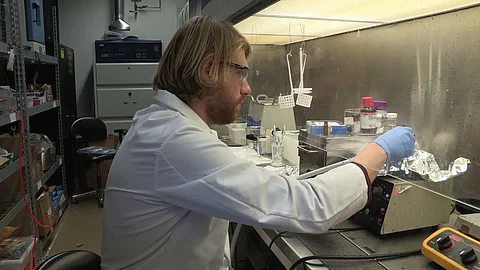

Scientists at the National Institute of Animal Biotechnology (NIAB) are working on a next-generation vaccine targeting Leptospirosis, a severe bacterial disease that affects both animals and humans. This illness, caused by over 300 strains of the Leptospira bacterium, remains a significant public health concern. The disease has been reported with increasing frequency due to the impacts of climate change, highlighting the urgent need for improved preventive measures.
According to the Department of Biotechnology-affiliated NIAB scientists, over one million cases of human leptospirosis are reported globally each year, resulting in approximately 60,000 deaths. Although antibiotics are available for treating this disease, their effectiveness diminishes once the bacteria infect critical organs, often due to delays in diagnosis. This creates an urgent need for better preventive strategies, particularly through vaccination.
Existing vaccines for Leptospirosis are limited in scope, providing only short-term immunity that is specific to certain strains of the bacteria. Additionally, they do not prevent bacterial shedding through urine, which poses a risk for the transmission of the disease. At present, vaccines are available only for animals, but these fail to offer protection against all bacterial strains and do not induce sterilizing immunity. Furthermore, there is no approved vaccine available for human use.
In response to these challenges, the NIAB research team, led by Dr. Syed Faisal, has taken steps toward developing a more advanced vaccine that offers broader protection. The team has identified and characterized lipopolysaccharide (LPS), a key antigen responsible for strain specificity in Leptospira bacteria. The team’s findings indicate that the host’s initial immune response to LPS plays a crucial role in determining the severity of the infection. If the immune response is inadequate, the infection can lead to multi-organ failure.
The study also highlights the potential of a component of LPS, called Lipid A, which has lower toxicity but significantly boosts the immune system. This discovery is seen as a major breakthrough toward creating a more effective vaccine. Lipid A has shown promise in enhancing immune responses, making it a strong candidate for inclusion in new vaccine formulations.
Additionally, the research team has identified Leptospira immunoglobulin-like proteins, known as LigA and LigB, as potential subunit vaccine candidates. When combined with potent adjuvants, such as alum and Lipid A, these proteins demonstrated remarkable efficacy. Experiments conducted on animal models, including mice and hamsters, confirmed that the combination of LigA and LigB with Leptospira Lipid A produced robust immune responses. These responses provided sterilizing immunity, preventing further infection and bacterial shedding.
Dr. Faisal explained that the research, supported by the Department of Science and Technology (DST), has provided new insights into the adjuvant properties of Lipid A, offering a promising pathway for the development of LPS-based vaccines. The combination of Lipid A and other antigens activates the innate immune system, generating a sustained and antigen-specific immune response.
The findings of the study have been published in the reputed international journals Open Biology and Vaccines. This research is seen as a significant step toward developing an advanced vaccine capable of providing long-lasting and broad-spectrum protection against this deadly zoonotic disease.
(Input from various sources)
(Rehash/Ankur Deka/MSM)
